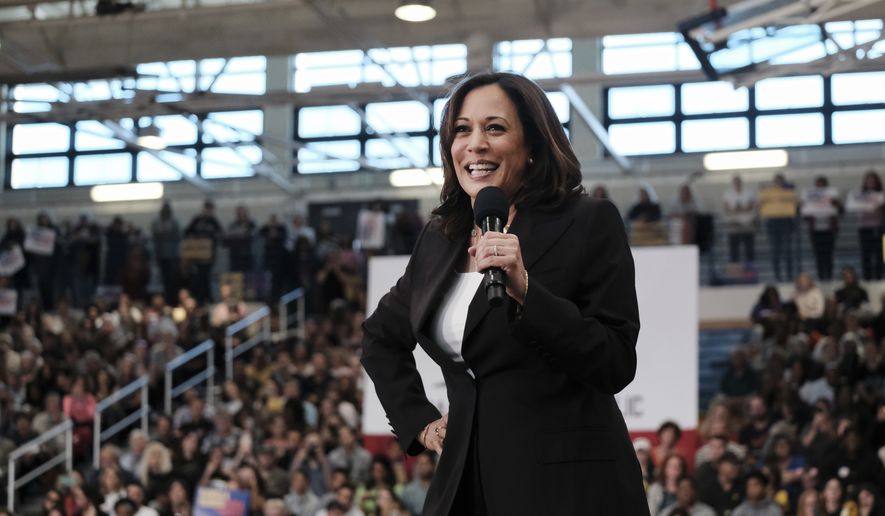Sen. Kamala Harris on Monday said she wants companies to prove they’re paying women the same as men for equal work and wants to fine those that don’t comply, looking to step up federal involvement in what her presidential campaign called “the most aggressive equal pay proposal in history.”
She said she’s looking for action from Congress, but if Capitol Hill balks she would take executive action as president to make federal contractors prove they’re providing equal pay for equal work.
The 2020 Democratic presidential hopeful says she wants to shift the burden of proof from employees to employers, following up on recent legislation that bolstered employees’ rights to take legal action for gender-based pay discrimination.
“It should not be on that working woman to prove it,” she told CNN. “It should instead be on that large corporation to prove they’re paying people for equal work equally. It’s that simple. It’s literally that simple.”
The new requirements would apply to companies with 100 or more employees and would impose a fine of 1% of their average daily profits for every 1% gap in pay for men and women after accounting for “differences in job titles, experience and performance.”
Companies would have to disclose their pay policies and inform the public, prospective employees and any shareholders whether they’re in compliance with the new federal rules.
Ms. Harris’ plan would put teeth behind a widely shared goal by making companies pay attention to what they’re doing, said Julie Kashen, a senior fellow at the Century Foundation.
“Equal pay is already the law of the land, and it’s not enforced and sometimes people don’t know that they’re not complying with the law because they’re not looking — they’re not doing those self-audits,” Ms. Kashen said.
Ms. Harris’ plan also calls for employees to be able to freely discuss their pay and seeks to bar companies from asking about applicants’ salary history.
The proposal would generate roughly $180 billion over 10 years, Ms. Harris’ campaign figures. She would use that money to fund her paid family and medical leave initiatives.
Congressional Republicans have been skeptical of expanding government mandates into companies’ pay and say creating a mandate would be an invitation for lawyers to snare companies in a tangle of lawsuits.
Ryan Young, a senior fellow at the free-market think tank Competitive Enterprise Institute, said there’s good reason to be wary.
“It’s the right problem, but the wrong solution,” he said. “Because of politicians’ limited creativity in this regard, even if they have the best of intentions, meddling with corporate governance will not have the consequences they intend. That’s going to have to be a genuine cultural change — not some bill that Congress passes.”
The plan also calls on companies to show that any pay disparities are based on merit, performance or seniority.
The notion of “equal value” can be a slippery thing to demonstrate, said Doug Holtz-Eakin, president of the American Action Forum, a right-leaning economics and policy think tank, and former director of the Congressional Budget Office.
“Under this approach, we basically presume firms are guilty until they prove themselves innocent … that strikes me as a pretty big precedent to set,” he said. “I’m underwhelmed — I just don’t think it’s going to work.”
Even if the plan can’t clear Congress, Ms. Harris said she would try to set a standard by forcing companies that bid for federal contracts to comply.
It’s a tactic President Barack Obama used repeatedly for his agenda, forcing federal contractors to boost their minimum wage and banning them from discriminating based on sexual orientation.
Mr. Young said the outcome could perversely block women from some opportunities.
“In this case, they will give government contractors an incentive to not hire women at all,” he said. “The federal government is free to set its own internal policies, but that doesn’t make it a good idea.”
In Ms. Harris’ home state of California, lawmakers took their own steps to try to address the fair pay issue.
In 2016, an amended state law went into effect that requires employers, with some exceptions, to pay men and women equally for “substantially similar” work.
Then-Gov. Jerry Brown signed legislation last year requiring publicly held companies based in California to have at least one female member on their board by the end of 2019.
When he signed the measure, he also issued a statement to the state Senate acknowledging objections and “serious legal concerns” with the legislation.
“I don’t minimize the potential flaws that indeed may prove fatal to its ultimate implementation,” he said. “Nevertheless, recent events in Washington, D.C., — and beyond — make it crystal clear that many are not getting the message.”
• David Sherfinski can be reached at dsherfinski@washingtontimes.com.




Please read our comment policy before commenting.